If you’ve been searching for a sustainable way to lose weight, you may have heard about the Anti-Inflammatory Mediterranean diet and its potential to reduce inflammation. But here’s the surprising twist: it turns out that addressing inflammation may actually be the key to successful, lasting weight loss. Inflammation affects everything from metabolism to energy levels, which makes managing it essential if you want to shed those extra pounds for good. So let’s dig into how inflammation with the Mediterranean diet works, why reducing inflammation is so important, and how you can make simple changes to feel your best.
Understanding Inflammation and How It Impacts Weight Loss
To understand how the Mediterranean diet can help with weight loss, it’s crucial to know a bit about inflammation and its effects on the body.
What Is Inflammation?
Inflammation is your body’s natural response to protect itself from harm. When you get a cut or catch a virus, inflammation kicks in to heal damaged tissues or fight infection. This kind of acute, or short-term, inflammation is helpful. However, long-term (chronic) inflammation is a different story. Chronic inflammation can be triggered by factors such as poor diet, stress, or lack of exercise. When it persists, it can damage tissues and organs and disrupt bodily functions—including those related to weight regulation.
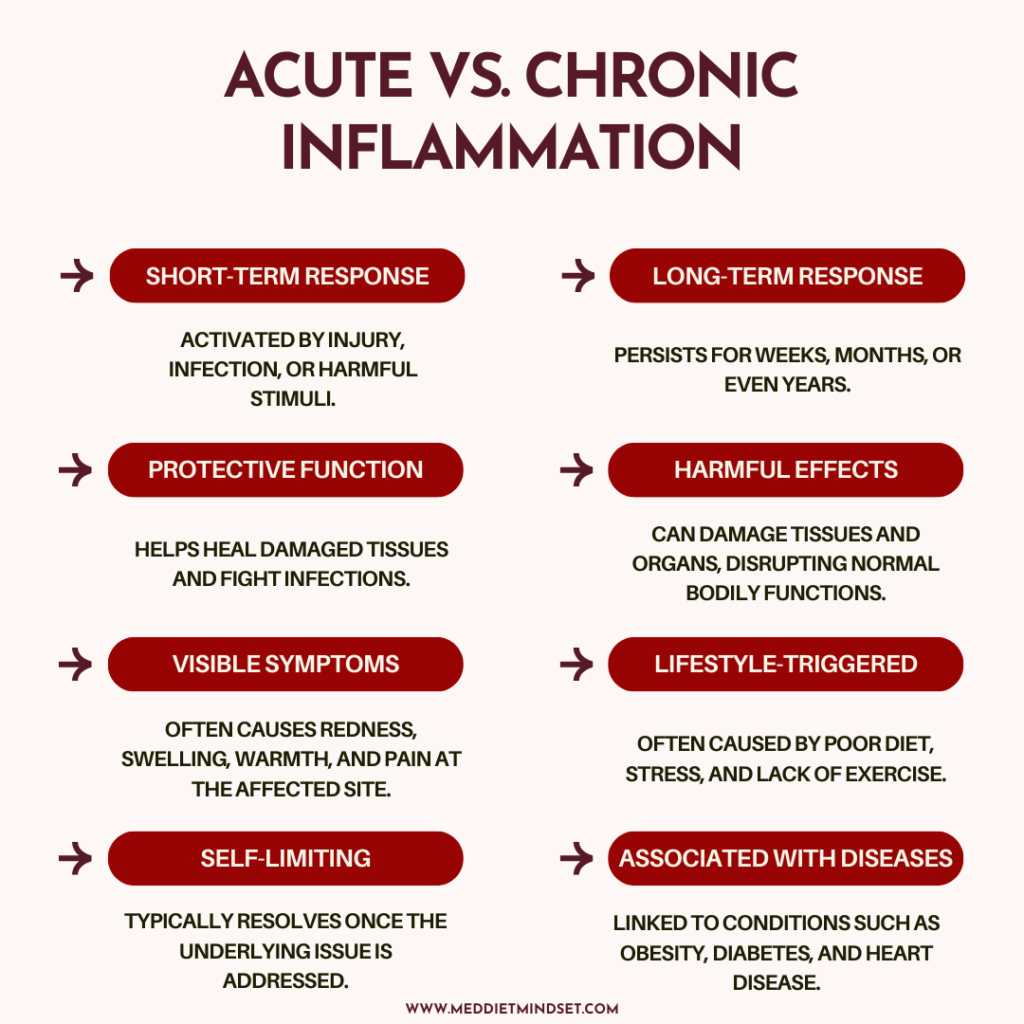
How Chronic Inflammation Affects Weight
The link between inflammation and weight gain is something I’ve seen time and time again in my work with clients. Chronic inflammation has a tendency to make the body resistant to insulin, a hormone that regulates blood sugar. When insulin sensitivity decreases, blood sugar spikes and falls erratically, leading to cravings and a tendency to store fat rather than burn it. Also, people with chronic inflammation often experience lower energy levels, making it challenging to stay active and stick to a workout routine. It’s a vicious cycle, but here’s where the Mediterranean diet shines.
Why the Mediterranean Diet Works: The Anti-Inflammatory Principles
The Mediterranean diet has been studied extensively, and one reason it’s so powerful is its focus on foods that naturally reduce inflammation. It’s packed with whole, unprocessed foods and rich in antioxidants, healthy fats, and anti-inflammatory nutrients—all working together to improve overall health and aid in weight loss.
Anti-Inflammatory Foods You’ll Love
This diet emphasizes foods that fight inflammation naturally. Some top picks include:
- Olive oil: Rich in monounsaturated fats and antioxidants like oleocanthal, which has anti-inflammatory properties similar to ibuprofen.
- Fatty fish: Salmon, sardines, and mackerel are packed with omega-3 fatty acids, which have been shown to reduce inflammation in the body.
- Fruits and vegetables: Loaded with fiber, vitamins, and antioxidants like polyphenols, these foods help combat oxidative stress and inflammation.
- Nuts and seeds: Almonds, walnuts, and chia seeds provide a hearty dose of healthy fats and fiber.
- Whole grains: Foods like quinoa, farro, and oats contain fiber, which promotes a healthy gut microbiome—a key player in reducing inflammation.
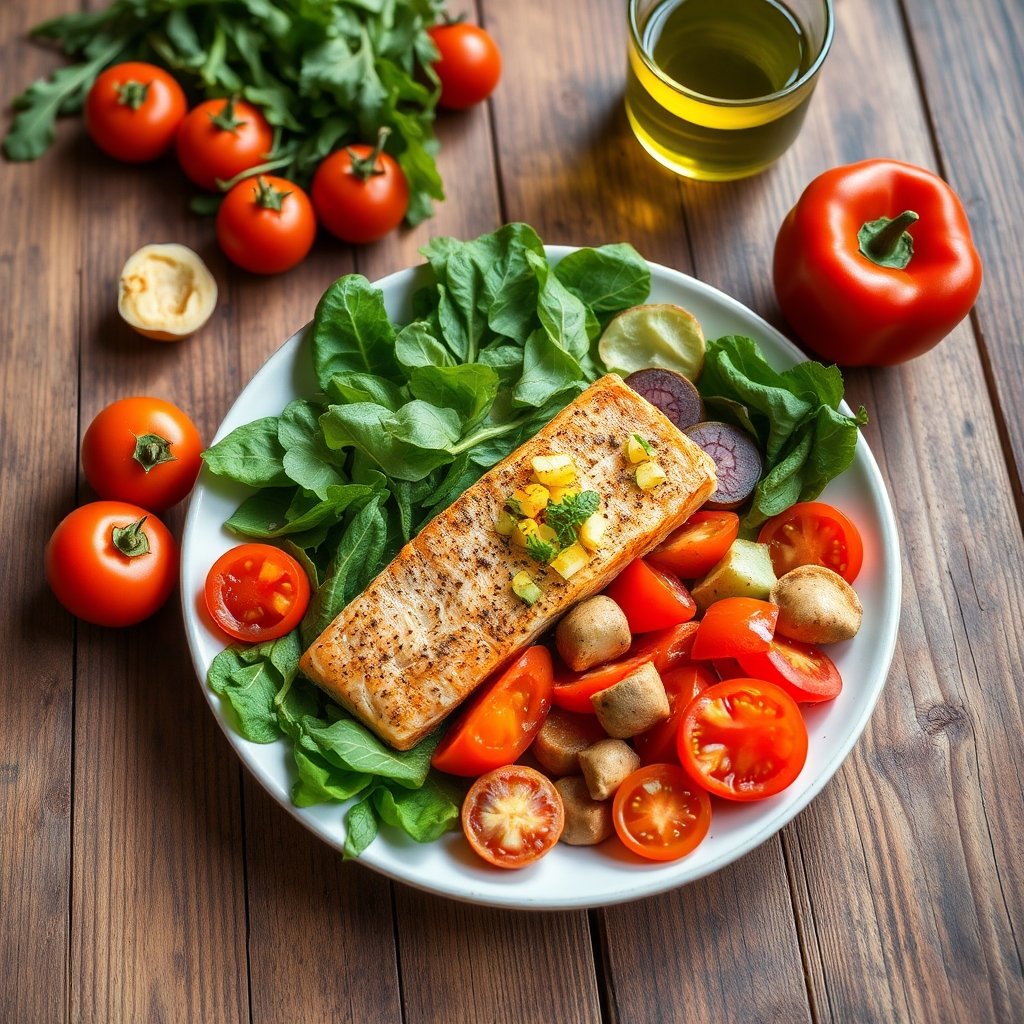
Minimizing Foods That Promote Inflammation
Equally important is avoiding foods that trigger inflammation, which the Mediterranean diet naturally does. Foods high in added sugars, unhealthy fats (like trans fats and some saturated fats), and processed ingredients can fuel chronic inflammation. For example, processed snacks and sugary drinks cause blood sugar spikes, leading to increased fat storage and inflammation. By minimizing these foods, you’re taking a big step toward a leaner, healthier you.
How Lowering Inflammation Directly Supports Weight Loss
By following an anti-inflammatory diet like the Mediterranean diet, you’re setting up your body to burn fat more efficiently. Let’s break down a few ways that reducing inflammation can directly impact your weight loss efforts.
1. Boosting Metabolism and Fat-Burning Potential
Inflammation can interfere with your metabolism, slowing it down and making it harder to burn calories. When inflammation is reduced, your metabolism functions better, making it easier for your body to use stored fat as energy. Plus, a more efficient metabolism can prevent the storage of new fat.
In my experience, clients who adopt an anti-inflammatory diet often find themselves with more energy and an easier time losing fat without drastic caloric restrictions. That’s the magic of a diet that works with your body rather than against it.
To learn more about how the Mediterranean Diet can aid in fat loss and promote a healthier metabolism, check out the article: Mediterranean Diet and Belly Fat Loss: Simple Steps.
2. Improving Insulin Sensitivity
One of the most significant impacts of inflammation is insulin resistance, which makes the body less effective at processing sugar. When insulin sensitivity improves, blood sugar levels stabilize, which reduces cravings and makes it easier to avoid overeating. A stable blood sugar level also encourages the body to use fat as fuel instead of storing it.
For instance, I worked with a client who struggled with constant cravings. After adopting a Mediterranean diet focused on reducing inflammation, she noticed her cravings dramatically reduced, and she started losing weight steadily. That’s insulin sensitivity in action!
3. Reducing Water Retention and Bloating
Inflammation often leads to water retention and bloating, which can make you feel puffy and heavier than you actually are. Anti-inflammatory foods help reduce this effect, making you look and feel slimmer. Eating fewer processed foods and more fiber-rich produce also supports a healthy gut, which reduces bloating and can further aid in weight loss.
4. Enhancing Energy Levels for Physical Activity
When you’re constantly inflamed, it’s common to feel sluggish. Reducing inflammation can lead to an increase in energy levels, making it easier to stay active and engaged in physical activity. Even moderate exercise can amplify the anti-inflammatory benefits of the Mediterranean diet, creating a positive feedback loop of better health and more weight loss.
Getting Started with an Anti-Inflammatory Mediterranean Diet
Ready to dive in? Here’s how to start incorporating anti-inflammatory Mediterranean diet principles into your daily routine.
Start with Simple Food Swaps
An easy way to ease into the diet is by swapping out inflammatory foods for healthier alternatives. Here are a few ideas:
- Replace processed snacks with whole foods like fruits, nuts, or yogurt.
- Swap out vegetable oils for olive oil.
- Choose whole grains like quinoa, farro, or barley instead of refined grains like white rice or white bread.
Add Anti-Inflammatory Herbs and Spices
Certain spices have potent anti-inflammatory properties. Try adding turmeric, ginger, garlic, and rosemary to your meals for a flavorful boost that also fights inflammation. These spices not only enhance taste but are also rich in antioxidants that combat inflammation at the cellular level.

Setting Realistic Expectations: How Long Until You See Results?
One of the most common questions I get is, “How soon will I see results?” While some people might experience reduced bloating or increased energy within a few days, noticeable weight loss typically takes a few weeks. This varies, of course, depending on the individual’s starting point and commitment to the diet.
Initial Benefits of Lower Inflammation on Health and Weight
Many people feel lighter and less bloated almost immediately when they reduce inflammatory foods. Increased energy, better digestion, and clearer skin are also common initial benefits. These positive changes build confidence and motivation, making it easier to stick with the diet.
Sustainable Weight Loss: The Long Game
The Mediterranean diet isn’t a quick-fix weight-loss scheme; it’s a lifestyle. That’s what makes it so effective for long-term weight loss. With time, the anti-inflammatory effects help regulate hormones and metabolism, allowing for gradual, sustainable weight loss.
One client I worked with, a woman in her 40s, had struggled with weight gain and low energy for years. After transitioning to an anti-inflammatory Mediterranean diet, she not only lost weight but reported feeling “lighter, inside and out.” Her energy levels improved, her cravings subsided, and she was able to stick to her new routine without feeling deprived.
Another client, a young man with prediabetes, found that his blood sugar levels normalized, and he lost 15 pounds in just a few months. These stories show that when we prioritize reducing inflammation, weight loss often follows naturally.
Final Thoughts: Embrace the Mediterranean Lifestyle for Lasting Change
If you’re ready to make a change that will not only help you lose weight but also improve your overall health, the Mediterranean diet offers a balanced, enjoyable approach. It’s all about reducing inflammation with the Mediterranean diet, eating nutrient-rich foods, and savoring each meal. With patience, consistency, and the right food choices, you’ll be on your way to a healthier, lighter, and more energized you.
Embrace this lifestyle makeover, and you might just find that inflammation reduction is indeed the missing piece in your weight loss journey!
F.A.Q.
The Mediterranean diet is renowned for its anti-inflammatory properties, primarily due to its focus on whole foods and healthy fats. Here are key elements that contribute to inflammation reduction:
- Rich in Omega-3 Fatty Acids: Fatty fish like salmon and sardines provide omega-3s, known for their ability to lower inflammation.
- Antioxidant-Rich Foods: Fruits and vegetables, particularly berries, spinach, and tomatoes, are high in antioxidants that combat oxidative stress.
- Healthy Fats: Olive oil, a staple in the Mediterranean diet, contains oleocanthal, which has anti-inflammatory effects similar to ibuprofen.
Incorporating these foods can significantly improve overall health and support weight loss by managing chronic inflammation.
Yes, the Mediterranean diet is a sustainable and effective approach for weight loss. Here’s why:
- Nutrient-Dense Choices: Emphasizes whole grains, lean proteins, healthy fats, and plenty of fruits and vegetables, which help keep you full and satisfied.
- Balanced Approach: Unlike restrictive diets, it allows for a variety of foods, making it easier to maintain long-term adherence.
- Reduced Inflammation: By focusing on anti-inflammatory foods, the diet supports better metabolism and hormone balance, which can enhance fat burning.
Many individuals find that adopting the Mediterranean lifestyle leads to gradual, lasting weight loss without feeling deprived.
To maximize the anti-inflammatory benefits of the Mediterranean diet, it’s important to limit certain foods known to promote inflammation. Here’s what to avoid:
- Processed Foods: Foods high in refined sugars and unhealthy fats can trigger inflammation.
- Trans Fats: Found in many fried and baked goods, trans fats are detrimental to health and should be eliminated.
- Excessive Alcohol: While moderate consumption may fit into the diet, excessive alcohol can lead to inflammation and other health issues.
By avoiding these inflammatory foods and focusing on nutrient-rich options, you can enhance the benefits of the Mediterranean diet and support your weight loss journey effectively.

Nour is a registered dietitian, nutrition researcher, and founder of MedDietMindset. With a passion for evidence-based nutrition, she specializes in Mediterranean diet strategies, PCOS management, and sustainable weight loss. Nour is dedicated to transforming complex scientific research into clear, actionable guidance to support healthier, long-lasting lifestyle changes. Through her blog, she empowers readers to build habits that prioritize well-being, balance, and vitality.
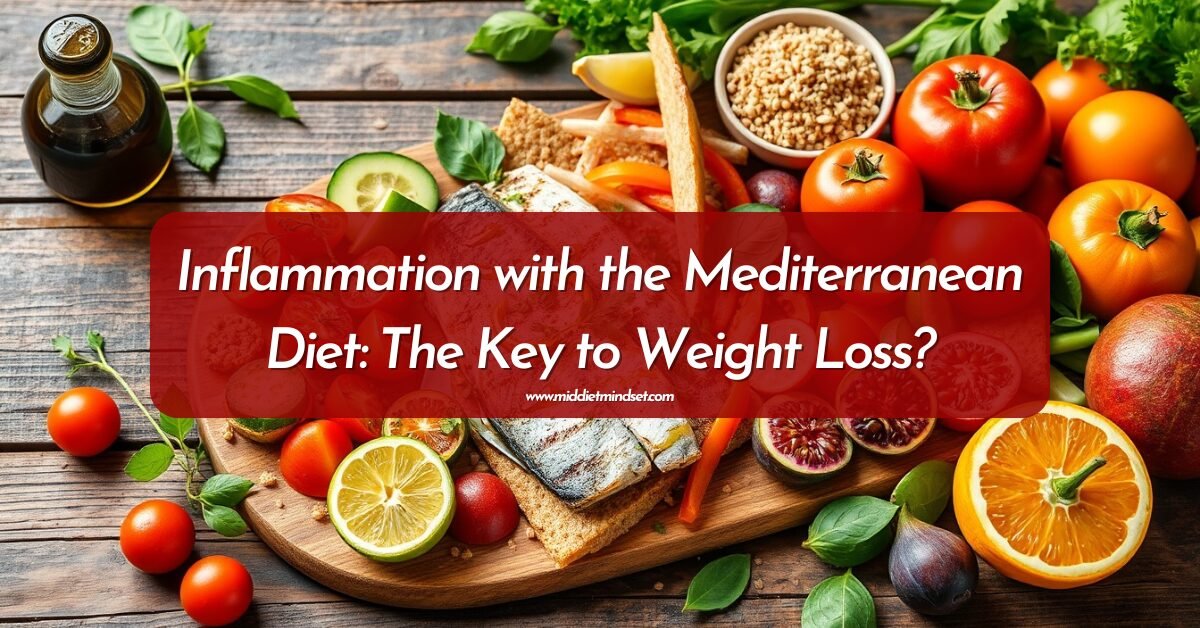

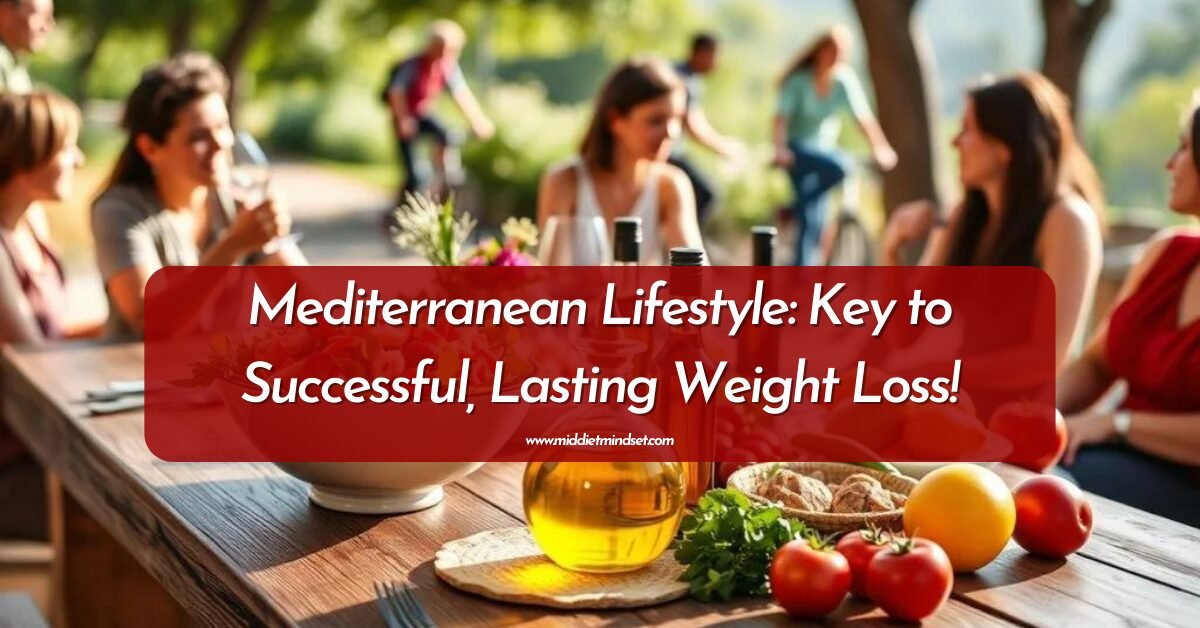
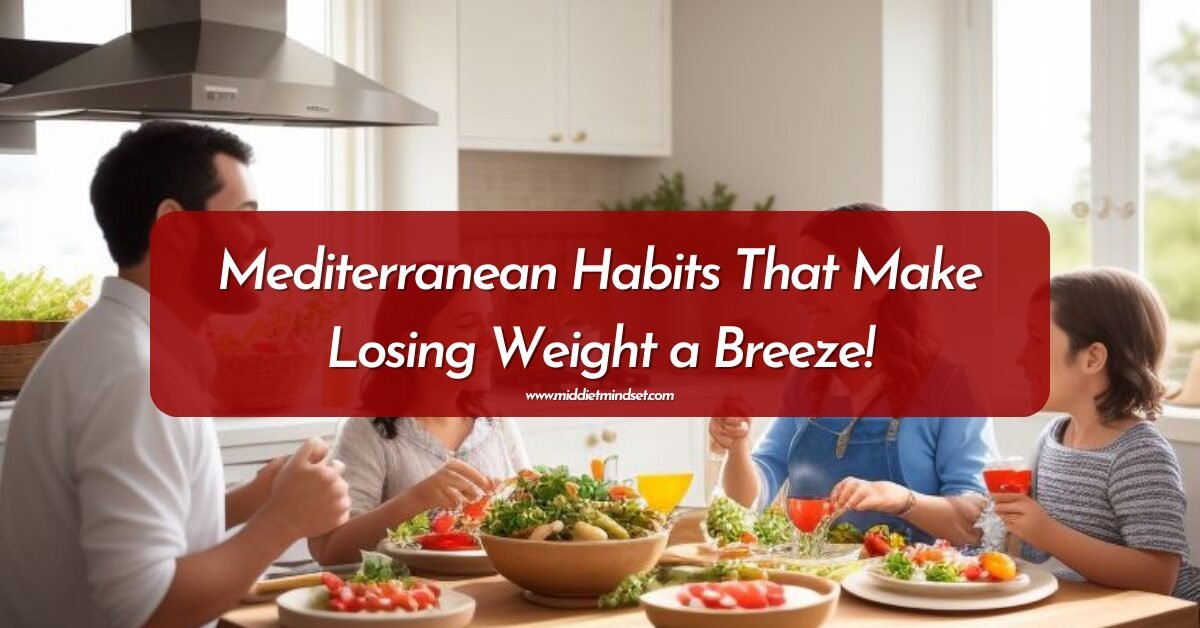

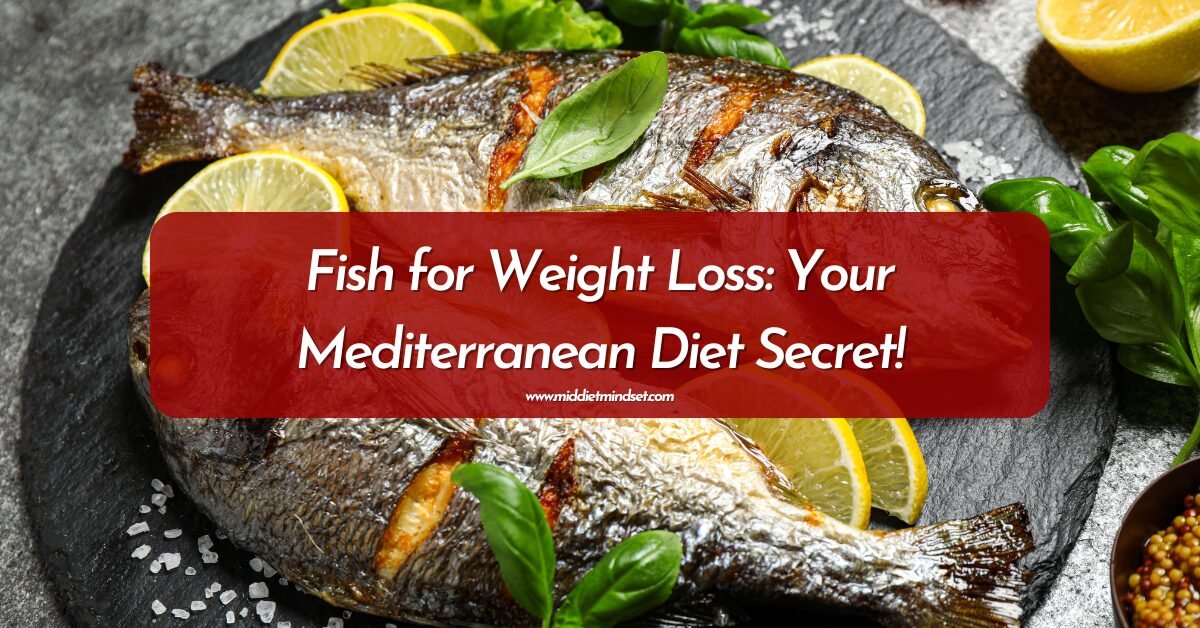
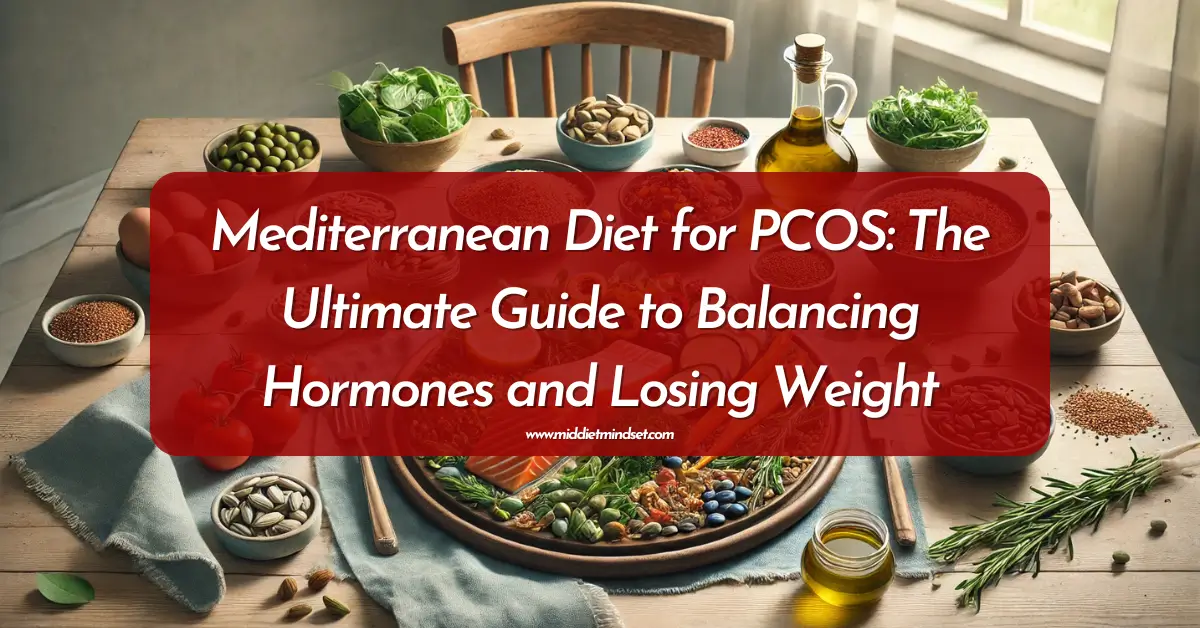
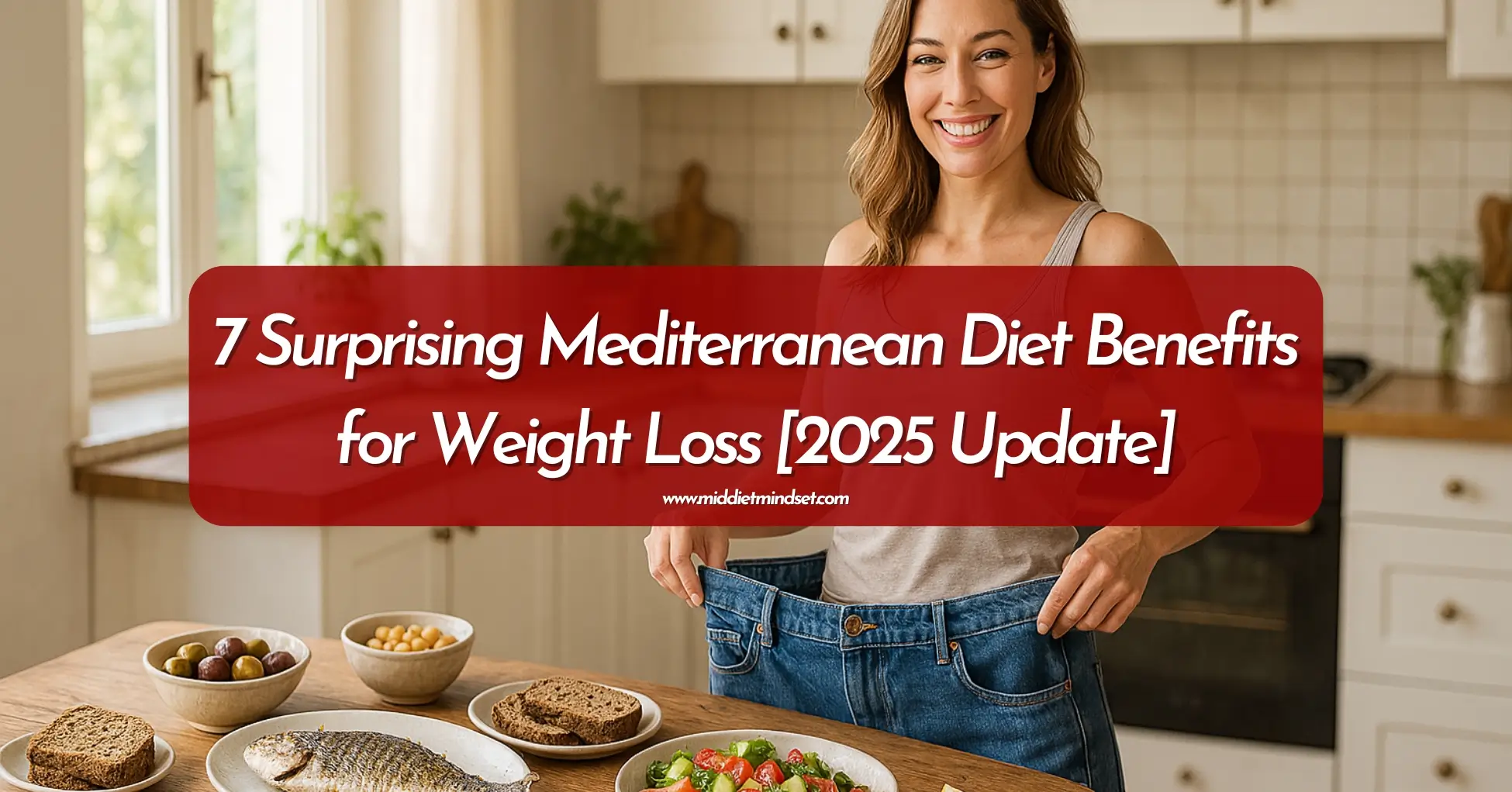
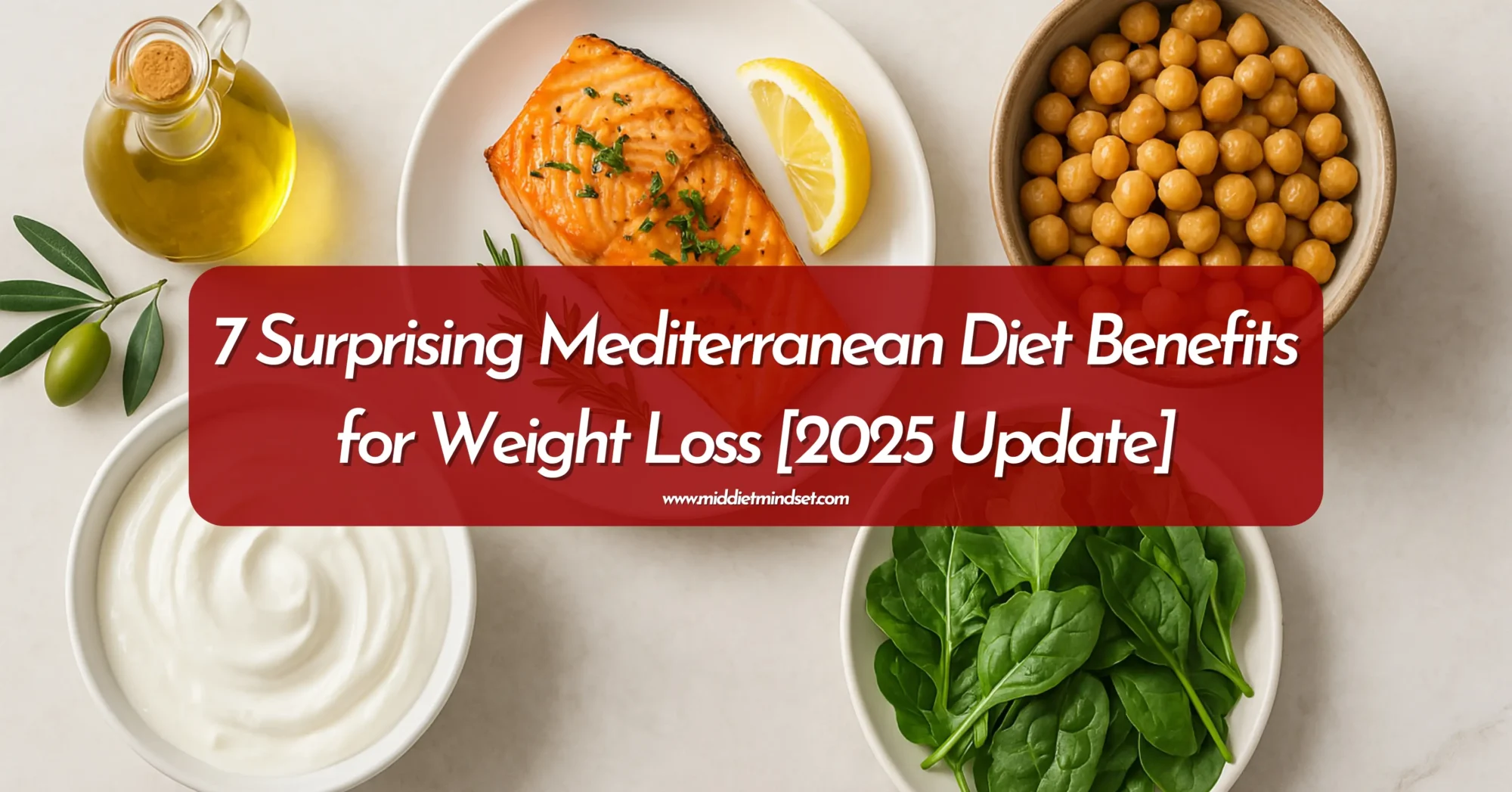
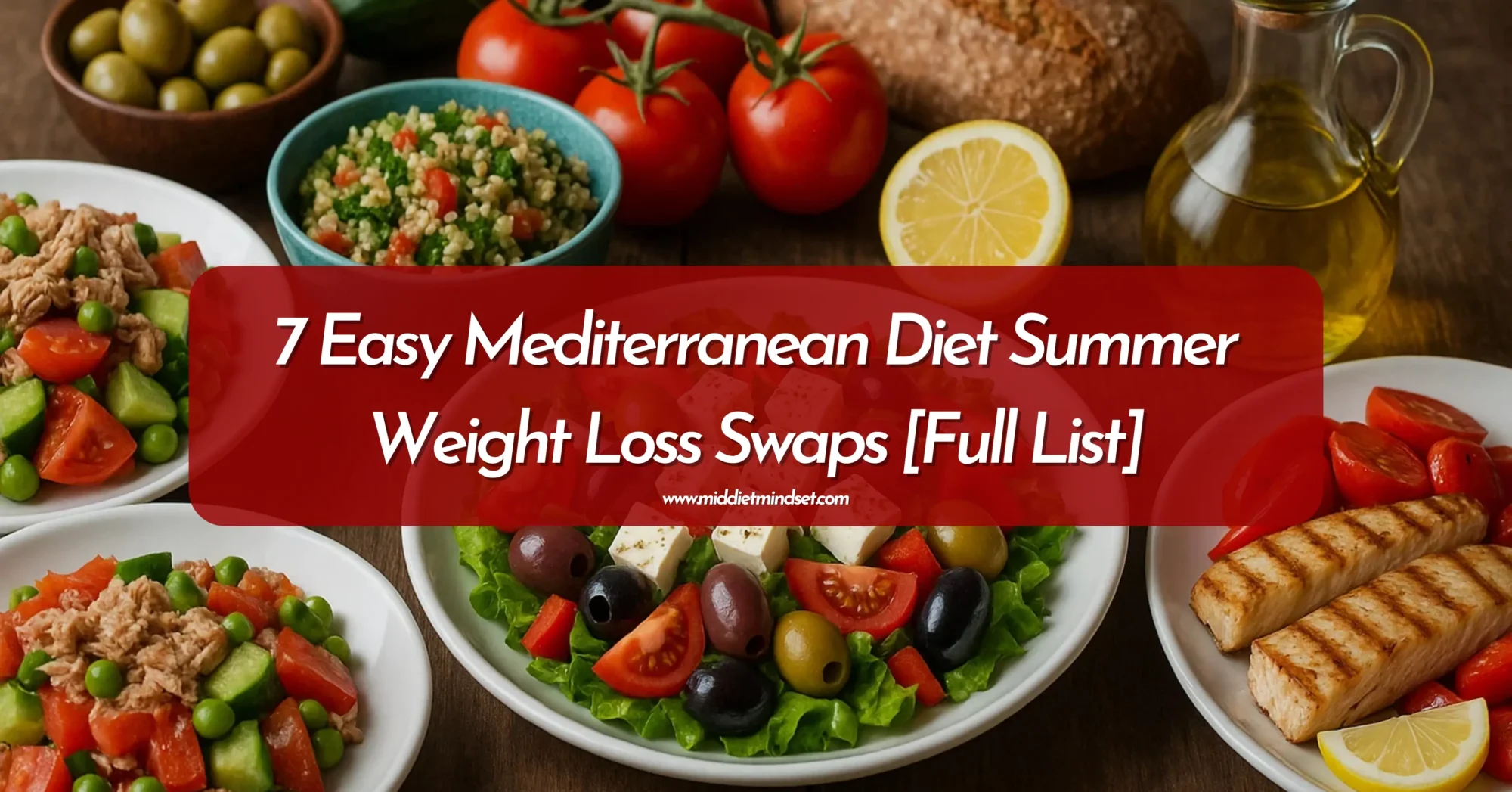
Pingback: Mediterranean Diet and Belly Fat Loss: Simple Steps – MedDiet Mindset
Pingback: Mediterranean Diet and Gut Health: Why Your Microbiome Matters! – MedDiet Mindset